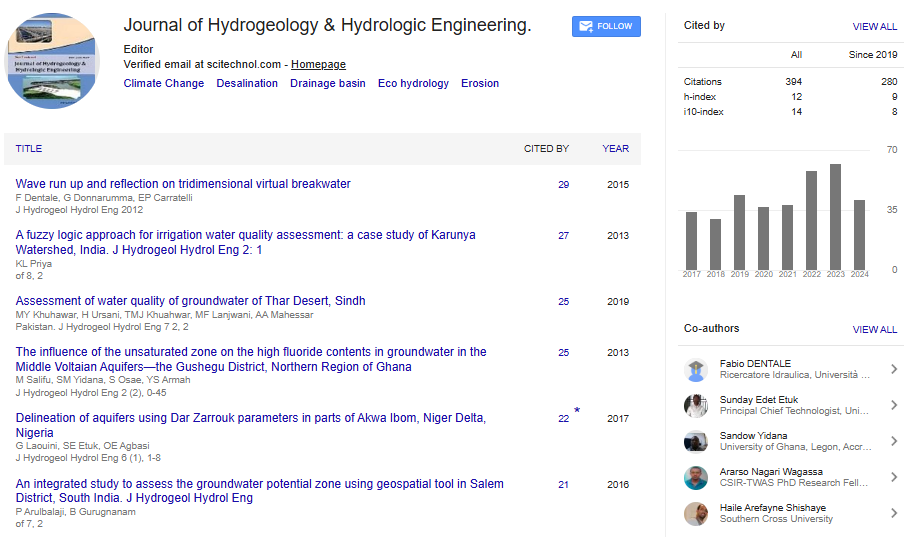Opinion Article, J Hydrogeol Hydrol Eng Vol: 13 Issue: 5
The Importance of Effective Stormwater Management: Reducing Flood Risks and Protecting Water Quality
Luiz Henrique*
1Department of Hydrologic Engineering, Technical University of Munich, Munich, Germany
*Corresponding Author: Luiz Henrique,
Department of Hydrologic Engineering,
Technical University of Munich, Munich, Germany
E-mail: henriquel46@gmail.com
Received date: 23 September, 2024, Manuscript No. JHHE-24-153113;
Editor assigned date: 25 September, 2024, PreQC No. JHHE-24-153113 (PQ);
Reviewed date: 09 October, 2024, QC No. JHHE-24-153113;
Revised date: 16 October, 2024, Manuscript No. JHHE-24-153113 (R);
Published date: 24 October, 2024, DOI: 10.4172/2325-9647.1000349
Citation: Henrique L (2024) The Importance of Effective Stormwater Management: Reducing Flood Risks and Protecting Water Quality. J Hydrogeol Hydrol Eng 13:5.
Description
Stormwater management is an essential aspect of urban planning and environmental conservation. With rapid urbanization and increasing climate variability, the frequency and intensity of rainfall events have risen, leading to greater stormwater challenges. Properly managing storm water is precarious not only for adapting flood risks but also for safeguarding the quality of local water bodies, which are often impacted by pollutants carried by runoff. This article delves into the importance, techniques and benefits of effective stormwater management.
Stormwater is the runoff generated from rain or melting snow that flows over impervious surfaces such as roads, rooftops and parking lots. Unlike natural landscapes, these surfaces do not allow water to infiltrate into the ground, resulting in increased runoff volumes. Inadequately managed stormwater can devastate drainage systems, causing urban flooding, eroding riverbanks and polluting water sources.
Urbanization plays a significant role in intensifying these challenges. As more land is developed, natural water infiltration decreases, leading to higher peak flows during storm events. This increase in runoff can quickly overburden stormwater infrastructure, resulting in flash floods, property damage, and even loss of life. Additionally, stormwater often carries pollutants like oil, heavy metals, pesticides and sediments into rivers, lakes and oceans, degrading water quality and threatening aquatic ecosystems.
Effective stormwater management is essential for numerous reasons. Firstly, it minimizes the risk of flooding by controlling the flow and volume of runoff. Stormwater management systems, such as detention basins, swales, and permeable pavements, help capture and control runoff, reducing the likelihood of downstream flooding and property damage.
Secondly, stormwater management plays an essential role in preserving water quality. Runoff from urban areas often contains a variety of contaminants, including automotive fluids, lawn fertilizers and industrial waste. Without proper management, these pollutants are carried into nearby water bodies, harming aquatic life and potentially impacting human health through contaminated drinking water sources.
Stormwater Management Techniques
There are several techniques and systems used to manage stormwater effectively. Some of the most common include:
Retention and detention basins: These are artificial ponds that temporarily store stormwater, allowing sediments to settle and pollutants to degrade. Detention basins release water gradually, reducing peak flow and flood risks, while retention basins allow water to infiltrate and recharge the groundwater.
Green roofs: Green roofs are covered with vegetation, which absorbs rainfall, reduces runoff, and provides thermal insulation for buildings. This technique also reduces the urban heat island effect, improving overall air quality in cities.
Permeable pavements: Permeable or porous pavements allow water to pass through surfaces like driveways and sidewalks, reducing runoff and promoting groundwater recharge. They are particularly useful in areas with high foot traffic, as they prevent water pooling and slippery surfaces.
Bioswales and rain gardens: These are vegetated areas that capture and filter stormwater. Rain gardens are typically shallow depressions planted with native vegetation that can absorb and filter stormwater. Bioswales are similar but are often used along roadways or parking lots to channel runoff away from impervious surfaces.
Rainwater harvesting: Collecting and storing rainwater from rooftops can reduce runoff and provide an alternative water source for irrigation and other non-potable uses. Rainwater harvesting systems can vary from simple rain barrels to more complex cisterns that store large volumes of water.
Benefits of stormwater management
Investing in stormwater management yields substantial environmental, social and economic benefits. It helps protect infrastructure, reduces maintenance costs, and minimizes property damage from floods. Enhanced water quality and reduced pollutant loads benefit public health by reducing waterborne diseases and ecosystem degradation. Moreover, stormwater management contributes to community fleibility by preparing cities to handle the adverse effects of climate change, such as more frequent and intense storms.
Conclusion
Effective stormwater management is more precarious than ever in today’s rapidly urbanizing and climate-sensitive world. By implementing a mix of traditional and green infrastructure, cities can control flooding, improve water quality and promote sustainable water resources. As communities continue to grow, developing innovative and eco-friendly stormwater solutions will be essential in safeguarding both the environment and public health for future generations.
 Spanish
Spanish  Chinese
Chinese  Russian
Russian  German
German  French
French  Japanese
Japanese  Portuguese
Portuguese  Hindi
Hindi 
